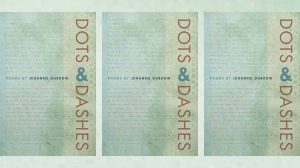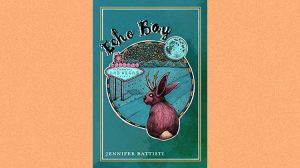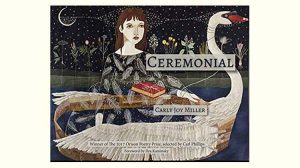House of the Cardamom Seed by Penelope Scambly Schott / Cherry Grove / 2018 / 978-1-62549-270-8
 One of the pleasures of making a pilgrimage to Powell’s Books in Portland, Oregon is sometimes stumbling on readings by writers you haven’t heard of. Such happened to me recently with Penelope Scambly Schott, the first of three poets in a group reading. I enjoyed all three, though her poems, and presentation, especially resonated with me, especially her humor. I see her (or hear her) very much in the New York School tradition, and I wonder if, being a former New Yorker, that was somewhat inevitable, but in any case her poems can be playful and funny, as was her reading.
One of the pleasures of making a pilgrimage to Powell’s Books in Portland, Oregon is sometimes stumbling on readings by writers you haven’t heard of. Such happened to me recently with Penelope Scambly Schott, the first of three poets in a group reading. I enjoyed all three, though her poems, and presentation, especially resonated with me, especially her humor. I see her (or hear her) very much in the New York School tradition, and I wonder if, being a former New Yorker, that was somewhat inevitable, but in any case her poems can be playful and funny, as was her reading.
Scambly Schott‘s poems in her latest book, House of the Cardamom Seed, range among experiences throughout her life, those from her early childhood ring the most powerful, and I think the book design, featuring artwork by Katheryn Kramer Waters, keys in on this as well, featuring a young Lost Girl in fetal position staring out at us. The humor and playfulness is here, but with more than a touch of darkness, as in the short poem “When the buses line up by the school, I remember”:
At 3:10 I stopped being uncool.
At 3:10 I wasn’t dressed wrong.
At 3:10 I could run without being on track team.
At 3:10 I could sing without joining the school chorus.
At 3:10 I could read whatever I wanted.
At 3:10 nobody would accuse me of being a brain.
At 3:10 I could head for the woods and scream.That was more than half a century back.
Those yellows buses look just the same.
That “scream” hints at darker things going on in her childhood, perhaps not at school but at home. At the least. it speaks to that despair a lot of us felt when kids, that sense of knowing that school was not about learning for curiosity’s sake, so much as learning how to conform to society. Which, of course, as she points out, hasn’t changed. The escape for her, and I, and I suspect everyone who reads poetry, was to “read whatever [we] wanted,” i.e. to pursue our curiosities, which is true learning.
I would have welcomed poems from her teen years, which would perhaps be ripe for both more humor and screaming. Cardamom gives us either poems of a younger girl or a more contemporary older and wiser woman. The less interesting poems are those about her dogs. As another poet put it in an anthology about dogs which came out a long time ago (I can’t remember either, though the phrasing has stuck with me), I just don’t “speak dog,” don’t feel that cuteness in dogs transcends to anything higher, though a favorite poem by Charles Bukowski is “history of a tough motherfucker” about one of his cats. Which isn’t cute. Maybe I’d like to read a non-cute dog poem.
I do, however, enjoy her poems about her husband, some/most of which again use humor, poking fun at marriage and married people in general, though ultimately showing affection for both. Scambly Scott shows us a value in long-term love, beyond desire, even though/if/as desire still exists. She can be tender, like in “To marry is to join the paired histories of ancestors you never met” with these lines: “marriage is your hand going to sleep under the covers / and you not being sure whose hand it is” though “Dear Repair Technician” went over well live:
My husband is not operating properly.
When he drives, he doesn’t speak,
or if he does, he says, that’s a Tesla.
In bed when I want my feet rubbed,
his hands will drift up to my breasts.
If he slices strawberries for cereal,
the stems remain in the kitchen sink.
Also he watches too much television.
He has not malfunctioned politically
for which I am grateful, and affection
is still reliable. Call with an estimate.
If marriage came with a warranty,
I believe it has long since expired.
Any minor improvement in function
will be appreciated as I do not plan
on replacing him.
Sincerely,
Her husband was at the reading, which somehow added to both the humor and the warmth. Though I couldn’t help wonder what his poem-reply might have been. Which is why poets should never marry other poets, I suppose.
House of the Cardamom Seed is melancholy, the touch of sadness in the childhood poems counter-balanced by the warmth and joy of the later-date poems. There is contentment, a woman content, now, with her life. Which is not happiness all the time, but neither is unhappiness all the time. Which comes from a wry wisdom. Which is all we can really ask of life. These poems are reminders and guides for how to transform our younger, earlier, dissatisfactions and setbacks in life into, as my poetry teacher Diane Wakoski taught, an affirming personal myth or narrative.





Tara K Shepersky says
I’ve never read Schott’s work; your review and excerpts have made me wish to discover it for myself!